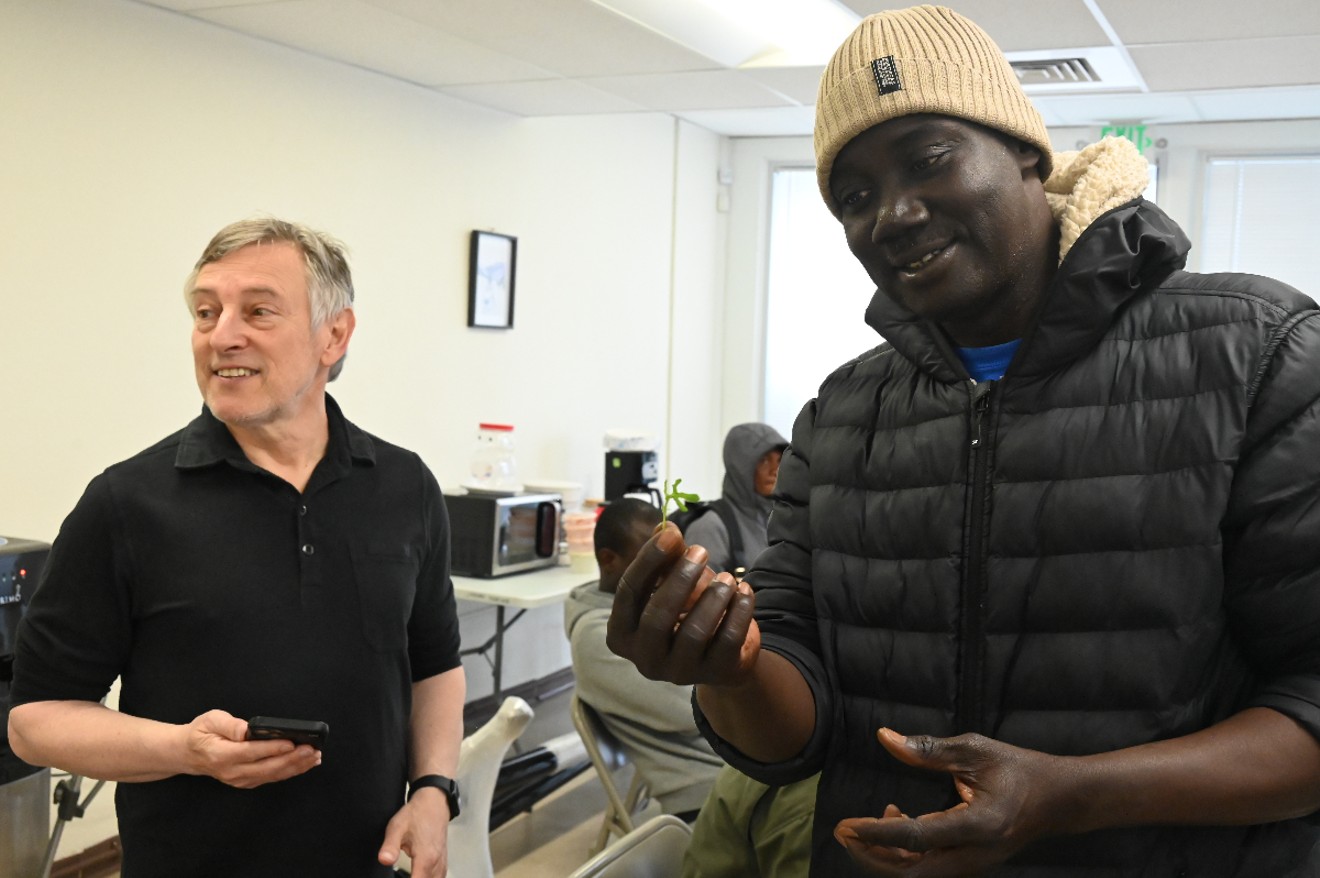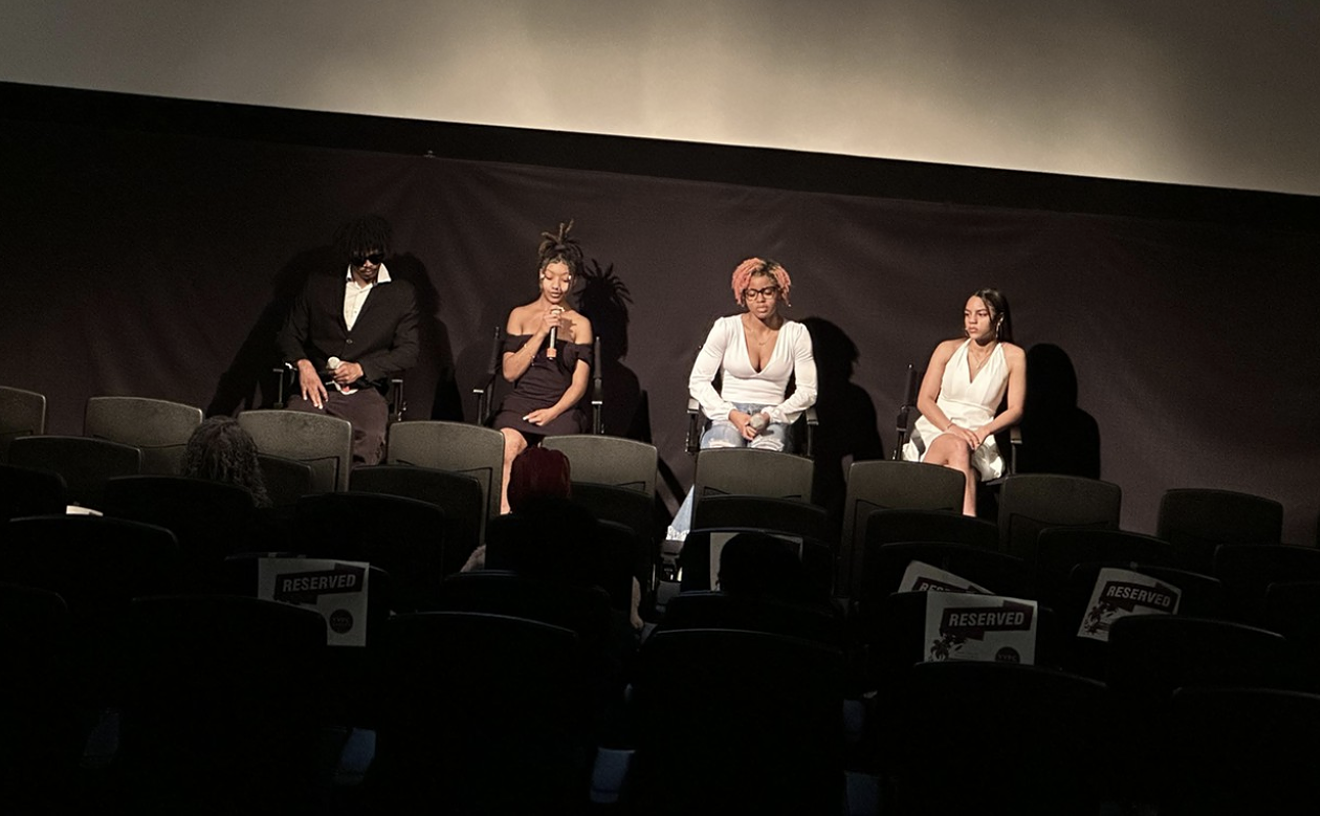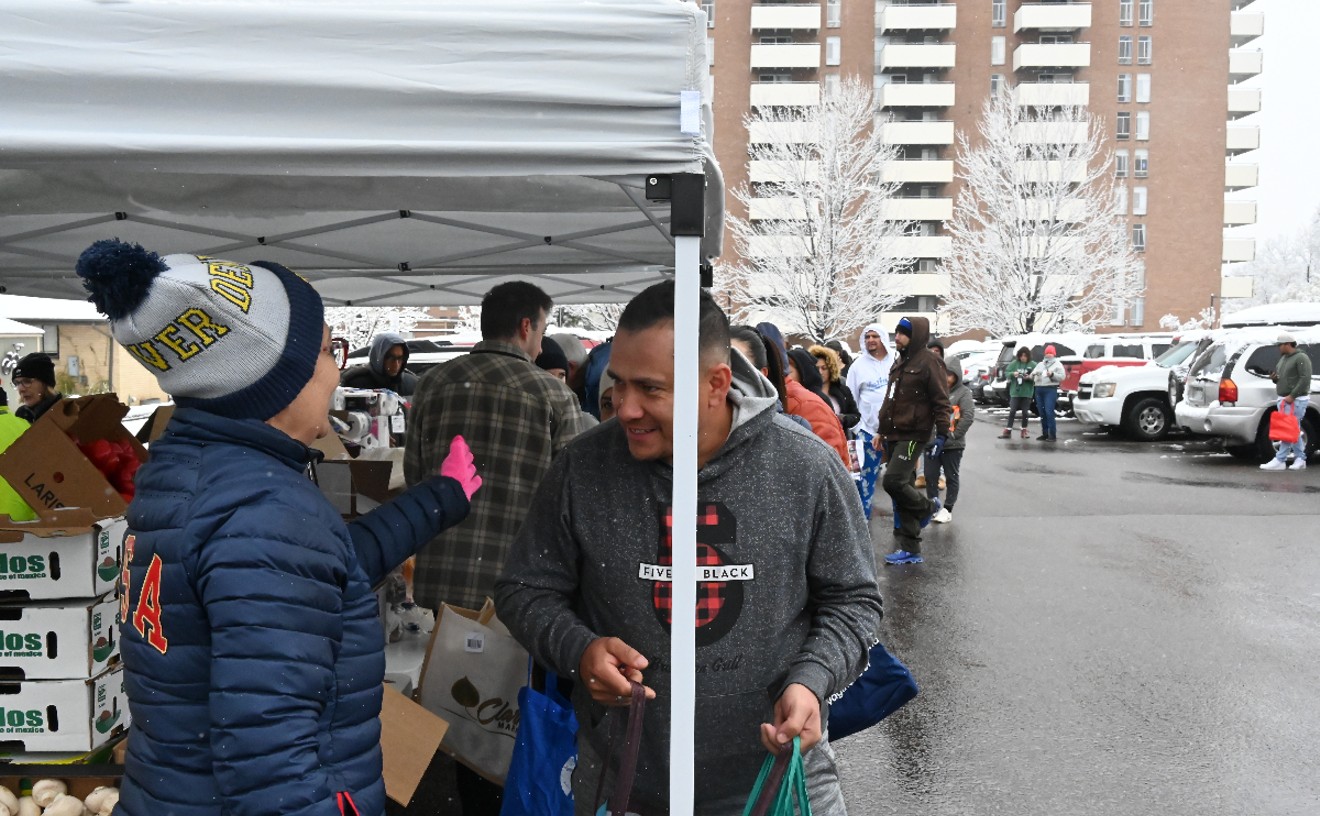The Aurora Migrant Response Network, a coalition of fifty nonprofits that has been handling the city's migrant response since October 2022, hosted its first cooking class at the Dayton Day Labor Center on April 18, when it taught West African migrants about the ingredients they'll find in the United States as well as a few simple recipes.
The class was the idea of Kadi Kouyate, a migrant response manager from Mali who joined the AMRN in October and says that West African migrants aren't eating a lot of the food donated to them for a couple of reasons. Most of them are Muslim, so they don't eat pork. They're almost all men, too, and they come from countries where women are expected to cook.
"We noticed that whenever they get food from these distribution places, they're throwing it in the trash," Kouyate said. "I decided to organize the cooking as part of the life skills classes."
Having come from hot and dry climates, they're not used to seeing food that looks like grass and leaves, according to Mateos Alvarez, who heads the AMRN. Even when these migrants do recognize unfamiliar items like tomatoes and carrots as food, they don't know how to cook with them, Kouyate adds.
While Denver has seen about 41,000 migrants, mostly from Venezuela, arrive since December 2022, Aurora has been dealing with an influx of mostly French-speaking migrants from West Africa; they are largely from Mauritania, along with a smaller number of migrants from Senegal and Mali.
Alvarez estimates that as many as 8,000 West African migrants have arrived in Aurora since October 2022. The influx was a challenge at first.
"Folks didn't know what was going on. We didn't know how to respond," Alvarez recalled. "They were here at our building in the hundreds, and we couldn't communicate with each other."
The cooking class reflects "a new phase" for the Migrant Response Network, which now has more French speakers as staff members and volunteers and is focused on solving the biggest challenges for its new West African migrant community.
Alvarez estimates that as many as 8,000 West African migrants have arrived in Aurora since October 2022. The influx was a challenge at first.
"Folks didn't know what was going on. We didn't know how to respond," Alvarez recalled. "They were here at our building in the hundreds, and we couldn't communicate with each other."
The cooking class reflects "a new phase" for the Migrant Response Network, which now has more French speakers as staff members and volunteers and is focused on solving the biggest challenges for its new West African migrant community.
More than a dozen migrants attended the first class. In addition to showing them that leafy greens are good and not trash, Kouyate, in French, taught the migrants how to chop onions and carrots and cook them with beef for a soup, how to boil and soften pasta, and how to mix together spring mix lettuce, mushrooms and a vinaigrette for a salad.
Many of the migrants who attended the cooking class tried mushrooms for the first time. One migrant said that in Mauritania, only goats eat mushrooms. Another migrant said that everyone in Mauritania avoids mushrooms because they're known to be poisonous.
Along the way, Kouyate and other bilingual volunteers took turns teaching the migrants how to pronounce "onion," "eggs," "zucchini," "carrot" and "mushroom" in English.
Chris Gattegno, the executive director of Aurora Community Connections, happens to be a native of France. Throughout the class, he was encouraging the migrants in French, saying cooking at home "is better than McDonald's" and that they have to learn English because "it opens doors."
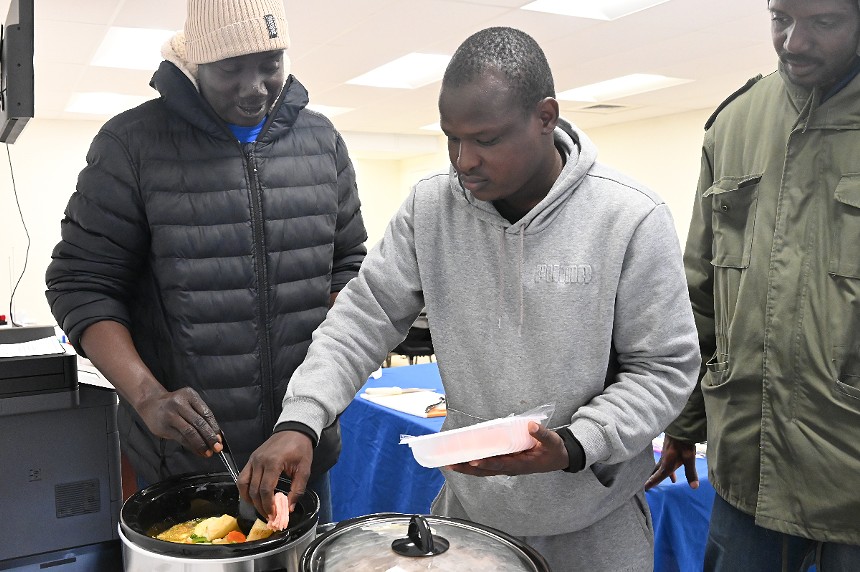
Cheikh Bombo Bothily, a migrant from Mali, adds ground beef to a soup that he's learning to prepare with other migrants.
Bennito L. Kelty
"On the short-term basis, for sure [French helps], but we're not going to help them that way," he explained. "We really need to push them to learn English, and the best way to learn a language is to be immersed."
The food was donated by Project Worthmore, which is dedicated to supporting Colorado refugees, and the Restoration Outreach Project, a food bank on East Colfax that also offers English classes and work readiness programs. Migrants cooked the food in $9 crockpots from Walmart that Kouyate had bought to teach them.
Dayna Kozlowski, the farm manager for Project Worthmore, attended the cooking class to offer her French skills. She also noticed a lot of the food donations to West African migrants in the trash.
"With all the food we bring in and distribute, we also noticed a lot of food was going to waste, or we would have a zucchini with a bite taken out of it," Kozlowski said. "They didn't know what to do with the produce."
According to Kozlowski, Project Worthmore is piloting a similar program, Munchie Mondays, that shows "the community what to do with the food that they're receiving, why it's important to eat it, and how to just be not wasteful with food."
Originally, large numbers of South American migrants were coming to Aurora in late 2022 and early 2023, and they needed food, clothes and connections to schools and job opportunities, Alvarez said. That was what led members of the Aurora Migrant Response Network like the Village Exchange Center, Project Worthmore, Aurora Community Connections, the Dayton Day Labor Center and the Restoration Outreach Project to band together.
However, the arrival of West Africans created a unique challenge for Aurora. Drawn by connections to Aurora's relatively sizable population of more than 3,000 West African immigrants, the newcomers arrived in the city with few English skills and, like South American migrants, without work authorization, leaving them with few means to care for themselves.
Cheikh Bombo Bothily, a migrant from Mali who has only been in the United States for three weeks, attended the cooking class on Thursday and was thankful "the organization took the initiative to think about our life skills and teach us."
"It's not easy when you're alone, when you live alone," Bothily said. "We don't have the skills to cook, we don't have the ability to cook. We've just been putting something together and eating that, which causes some depression, because we're missing our home country."
Bothily said he left his home country because there is "war, the government is unstable, things are not going well. It's not easy."
From Mauritania to Aurora
A Mauritanian migrant who asked only to go by Abdoul out of fear of being found on social media said that he left Mauritania out of fear of being killed because he's Black. He said that Black people are at risk of death or slavery in the country."The reason I left Mauritania is that the people are not equal," he said. "There are several ethnic groups and races there, and mine is at the lowest level."
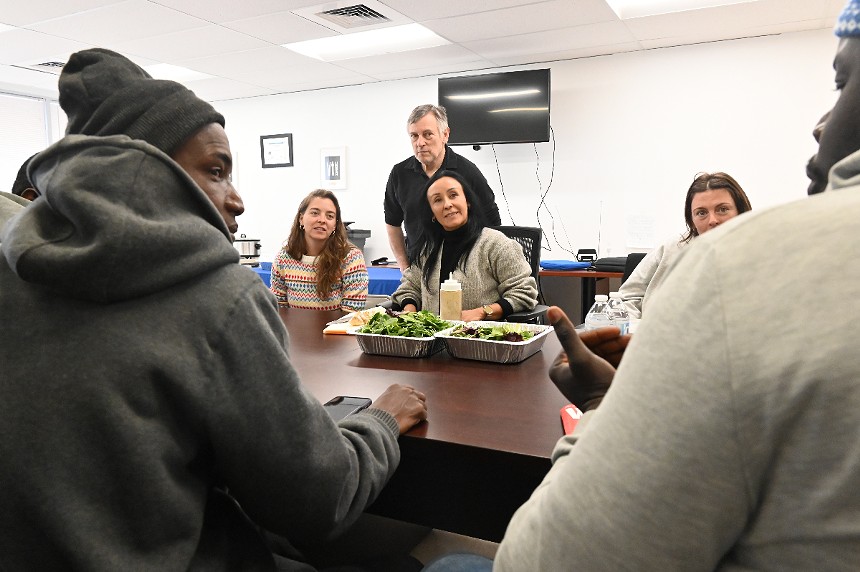
Volunteers listen as a West African migrant explains in French his thoughts on the food in America.
Bennito L. Kelty
"The White Mauritanians basically do not consider us as Mauritanians," Abdoul said. "We are discriminated against. Even with diplomas, we are still discriminated against because we're not in the right group. It goes as far as being killed and enslaved and persecuted."
Mauritania was the last country in the world to officially ban slavery — in 1981 — but it didn't start enforcing criminal penalties against the crime until 2007. Aurora's Mauritanian migrants say that slavery still exists in their native country and is a real threat to them.
Although the term "migrants" refers to people immigrating to find work, the West Africans coming to Aurora since 2022 have been fleeing war, political instability and slavery.
Still, Alvarez and the Migrant Response Network call them migrants because many of them are searching for work. Alvarez said that during the past few months, the West African arrivals have been almost all men because they have a better chance at work.
The Dayton Day Labor Center and other members of the AMRN recently started assisting West Africans with asylum claims because they can get work permits 120 days after submitting their asylum claims. Denver's local government is helping Venezuelan migrants take this route as well.
People who flee their native country for safety might also be referred to as refugees, but for someone to earn a legal refugee status, they have to apply for and earn that status while in their home country.
According to an August article by the Associated Press, West Africans are flying to South and Central America and joining the Venezuelan migrants on their way to the United States, a route they learned about on social media.
Nearly all of the West African Migrants that have arrived during the past year and a half speak French or Pulaar, with a few also speaking Wolof, Alvarez said.
After the cooking class on Thursday, Abdoul felt "taken care of" because "they showed me how to cook as an example of taking care of myself."
"I'm not used to that approach," he said. "At home, nobody does that for me. You have to learn it for yourself."
Abdoul was the migrant who said that mushrooms are only goat food, but he enjoyed the taste of a mushroom with vinaigrette on top, saying it tasted like garlic.
Kouyate was confident the cooking class would "boost their spirits, give them different thoughts than what they're facing right now."
Kouyate plans to host more cooking classes throughout the year, but she's still figuring out a schedule. In addition to teaching simple recipes with donated food, the cooking classes will focus on "having a free discussion with them" and "try to get to know each other, try to support them mentally because they're facing so many lack of resources, lack of health care access, legal assistance, housing assistance," according to Kouyate.
She hopes to develop other life skills courses for West African migrants in addition to the cooking class, which she won't host every month but wants to repeat regularly. She doesn't want the West African migrants to think that "the U.S. is just stress, stress, stress," she noted.
"We're going to try to organize some different activities on a monthly basis," Kouyate said. "So they can have at least a chance to integrate into the U.S. system and have a different mindset about the U.S. and get a chance to embrace the culture."
Many of Aurora's West African migrants "don't even know how to sign a paper, they don't know how to hold a pen," Kouyate pointed out. "They definitely need educational spaces, they need life skill places, they need coaching."
Kouyate plans to host more cooking classes throughout the year, but she's still figuring out a schedule. In addition to teaching simple recipes with donated food, the cooking classes will focus on "having a free discussion with them" and "try to get to know each other, try to support them mentally because they're facing so many lack of resources, lack of health care access, legal assistance, housing assistance," according to Kouyate.
She hopes to develop other life skills courses for West African migrants in addition to the cooking class, which she won't host every month but wants to repeat regularly. She doesn't want the West African migrants to think that "the U.S. is just stress, stress, stress," she noted.
"We're going to try to organize some different activities on a monthly basis," Kouyate said. "So they can have at least a chance to integrate into the U.S. system and have a different mindset about the U.S. and get a chance to embrace the culture."
Many of Aurora's West African migrants "don't even know how to sign a paper, they don't know how to hold a pen," Kouyate pointed out. "They definitely need educational spaces, they need life skill places, they need coaching."
Caring for Migrants in a "Non-Sanctuary City"
While the City of Denver responded to its migrant crisis for the past year with offers of food, shelter and transportation to other cities, the City of Aurora has a different approach.Denver has spent more than $69 million on supporting migrants, because as a county and city, Denver has its own health and human services department. Aurora is represented by three different counties, and none have offered any migrant support to the city government or Aurora nonprofits.
After seeing that Denver had to make budget cuts to afford its migrant response, the Aurora City Council committed in late February to not funding a response to migrants and passed a resolution that said it would let Aurora nonprofits handle them on their own while reaffirming that it's a "non-sanctuary city," a title self-imposed by the city in May 2017.
Alvarez doesn't see how a city that calls itself "The World in a City" also calls itself a non-sanctuary city, but he admits that the resolution provided clarity, and that the city's absence hasn't been a problem for nonprofits like his.
"We've been able to move with our partners to a point where we're coordinating with each other. Nationally, people are wanting to help," he says. "But it takes coordination, it takes resources, and thank goodness we created the Migrant Response Network and we built a community out of what could have been a tragic beginning."

